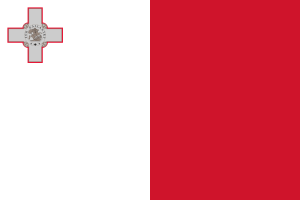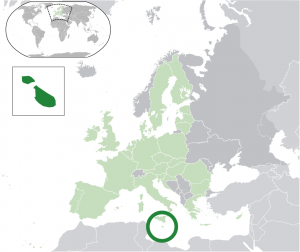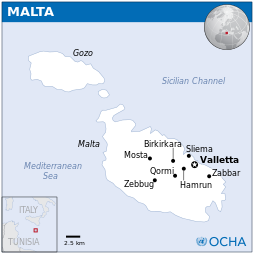General Business Information

The Maltese Islands are a group of small rocks, jutting out from the center of the Mediterranean Sea. In these conditions, they would have been relegated to the footnotes of history. Yet, ever since the archipelago was first colonized thousands of years ago, these islands have often played a crucial role in the making of history. Their strategic location at the heart of the Mediterranean Sea makes up for all the lack of natural resources here. Malta, the largest island, and her sister islands of Gozo, Comino, Filfla are strategically placed in the narrow channel joining the eastern and the western basins of the Mediterranean . . . a bridge between Southern Europe and North Africa and between Western Europe and the Middle East. This had landed the Maltese Islands right in the middle of the most important historic events: the wars between Rome and Carthage, the rise of Islam, the Crusades, the wars between Christians and Muslims, the rise and fall of Napoleon, the rise and fall of the British Empire, the fight for democracy against Fascism and Nazism, the Cold War, the rise of a United Europe and the challenges of the Third Millennium
Besides this rich cultural heritage, Malta offers a solid business and an industrial background that goes back 50 years. Testimony to this, the island is home to hundreds of foreign companies all operating within a well-developed economic and industrial structure.
Today Malta is a well-connected investment location boasting an advanced communications setup and a business environment which gives every incentive for companies to invest, grow, innovate and compete in a global marketplace.
 Boasting a highly productive, English speaking workforce, a European time zone, a Mediterranean lifestyle, a competitive incentives package, as well as frequent air and sea connections, Malta is a sure choice for foreign direct investment and international trade. In addition, Malta’s status as an EU Member State, together with the adoption of the Euro on 1st January 2008, further enhances the country’s attractiveness as a center for international business in the Euro-Mediterranean region. [Source: About Malta] Malta is an EU member nation strategically located at the heart of the Mediterranean with very close ties to mainland Europe, North Africa and the Middle East. The islands is considered the best choice for investments in knowledge-based sectors and high-end manufacturing. Malta is considered an ideal logistical hub due to its excellent port infrastructure.
Boasting a highly productive, English speaking workforce, a European time zone, a Mediterranean lifestyle, a competitive incentives package, as well as frequent air and sea connections, Malta is a sure choice for foreign direct investment and international trade. In addition, Malta’s status as an EU Member State, together with the adoption of the Euro on 1st January 2008, further enhances the country’s attractiveness as a center for international business in the Euro-Mediterranean region. [Source: About Malta] Malta is an EU member nation strategically located at the heart of the Mediterranean with very close ties to mainland Europe, North Africa and the Middle East. The islands is considered the best choice for investments in knowledge-based sectors and high-end manufacturing. Malta is considered an ideal logistical hub due to its excellent port infrastructure.
Progress and flexibility are key factors in the success of Malta’s ability to react quickly to international trends and the global market place. The pro-business government continually seeks to strengthen Malta’s attractiveness as an open market economy. Malta was one of the last countries within the European Union to enter the recession and it was also one of the first countries to rebound from the economic downturn. In essence Malta showed great resilience and emerged in a strong position.
A long-standing, full imputation tax system has existed in Malta since 1948. The rate for corporate taxation in Malta stands at 35%; however upon distribution of dividends, shareholders may qualify for a refund generally equivalent to 6/7th of the tax paid, thus resulting in a paid tax rate of 5%. [Source: Top reasons to invest in Malta]

During these past 40 years, the country has notched up an impressive record in attracting foreign investors to Malta, and who continue to re-invest in their production and service facilities on the island, by successfully moving from labor-based to knowledge based industry and, in so doing, attracting Foreign Direct Investment from countries like the UK, Germany, Italy, France, Spain and the United States. Malta’s favorable industrial climate and pro-business policies have been the pillars on which foreign companies have built their success.
Direct labor costs also hold up well, at a competitive 30% to 50% of those in the older EU Member States. When labor costs, productivity and working hours are factored together, the picture is even better. Malta’s workforce then becomes cheaper than all established EU economies. What’s more, when social security costs and other employment taxes are added in, Malta’s total labor costs are competitive with the new EU Member States and significantly lower than established EU Members.
Financial services, advanced manufacturing, life sciences, ICT, creative industries and aviation related activities are changing Malta’s foreign investment climate, further testimony that Malta is one of the most advantageous investment locations in Europe and the Euro-Med region.
Adaptability, innovation, competitiveness and flexibility are key elements of Malta’s economic strategy. Throughout the years, these traits have helped the Maltese to adjust to the islands’ realities as well as to those of the international business environment. This ability to accommodate necessity has kept investors interested in setting up business on the island. Today, official statistics demonstrate that the package the country offers, ranging from a highly skilled workforce to the availability of fiscal and financial incentives, makes Malta attractive even in difficult times. [Source: Malta Enterprise]
Market Entry Strategy
The application of uniform EU standards and certificates makes it easier for U.S. firms with prior experience doing business in Europe to expand their business interests in Malta. Although not required, most foreign suppliers appoint an agent or distributor to market their products in Malta. Franchising, licensing and joint venture agreements are also common. Several companies have chosen to set up an operating/regional office.
For public sector procurement, U.S. companies are advised to partner with Maltese companies to increase their chance of success. U.S. firms considering investing in Malta should review the relevant regulations with the quasi-government investment promotion agency Malta Enterprise.
[Source: US Embassy in Malta]
Fast Facts
|
Capital |
Valletta |
|
Time zone |
GMT+1 |
|
Area |
316 sq km |
|
Population |
417,000 |
|
Climate |
Mild, rainy |
|
Official Languages |
Maltese and |
|
Currency |
Euro |
|
GDP per capita |
€ 15,300 as of |
|
Labor force |
165,000 |
|
Unemployment rate |
6.0% |
|
Main trading partners |
Italy, UK, |
|
Weights and measures |
Metric |
|
International dialing code |
+356 |
|
Internet domain suffix |
.mt |
|
Quality of life |
Rated the best |
|
Democratic rating |
15th |
[Source: Malta Enterprise]
Setting up a Business
When setting up a new business you will need to decide what legal format you want to operate under. This is one of the most important decisions you need to take at an early stage as this will determine how you will operate your business in the future. To determine what legal format is best for you, you need to understand some of the basic differences. The most common legal formats for businesses are:
- Sole Trader
Sole Traders need to register with the Employment and Training Corporation as self-employed. These can start trading straight away as long as the required permits and registrations are carried out.
|
Liability |
If the |
|
Management |
The owner is |
|
Finance |
Normally, the |
|
Profits |
All profits go |
|
Taxes |
Self-employed |
- Partnerships
Partners need to register with the Employment and Training Corporation as self-employed. You should seek the advice of a lawyer and form a ‘Deed of Partnership’. Partnerships can start trading straight away, as long as the required permits and registrations are carried out.
|
Liability |
If the |
|
Management |
The partners |
|
Finance |
Generally, the |
|
Profits |
All profits |
|
Taxes |
Self-employed |
- Private Limited Liability Companies (Ltd.)
Companies cannot just start operating, but need to follow a predefined process of registration and set-up (Business Registration). It should be noted that a Company is a legal entity in its own right.
|
Liability |
The |
|
Management |
The business |
|
Finance |
Generally, the |
|
Profits |
Dividends are paid to the shareholders. |
|
Taxes |
The Company pays |
- Cooperatives
A Cooperative is similar to a Company but its employees, or a large percentage of them, own the Company. A Cooperative cannot just start operating but needs to follow a predefined process of registration and set-up. It should be noted that a cooperative is a legal entity in its own right.
|
Liability |
The |
|
Management |
A Board of |
|
Finance |
Generally, the |
|
Profits |
Dividends are |
|
Taxes |
The |
[Source: Business First]
American Corporate Services offers experience and expertise for astute investors who wish to establish offshore businesses. Whether an investor wishes to immigrate or simply to establish a business entity, our network of professionals has the ability to advise, assist, direct and enable clients to understand and navigate the process for Malta company formation.
Our services include everything you need for starting a new business in Malta. In addition to helping to establish a Malta business bank account, helping you set up your business to conform to Malta accounting standards and to comply with Malta taxes, we also offer boutique amenities such as Malta secretarial services. We can even help you to create a Malta virtual office that will appear to others as though you are actually in Malta, even though you may be just about anywhere else on the globe at the time. Our business is making your investment a success
